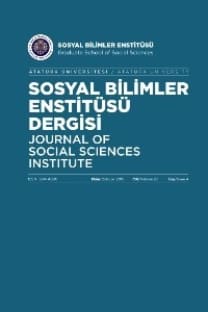Relationship Between Learning Style and Intelligence in Learning English Among Monolingual and Bilingual Students / İngilizce Öğrenen Tek ve Çift Dilli Öğrencilerde Öğrenme Yöntemi ve Zeka İlişkisi
Abstract: The study has investigated the relationship between learning styles and intelligence
Anahtar Kelimeler:
Tek dilli, çift dilli, zeka, öğrenme yöntemleri, akademik başarı, İngilizce dili
The study has investigated the relationship between learning styles and intelligence with academic achievement in learning English as a foreign language among male and female monolingual (Farsi Speakers) and bilingual Students (Farsi and Azerbaijan-Turkish Speakers) in Islamic Azad University-Central Tehran Branch and Khoy Branch, using Felder-Soloman questionnaire. The findings have shown monolinguals are better at visual learning styles and bilinguals are better at verbal learning styles. With regards to the achieved results, it can be concluded that bilingual students learn via senses, events, and observations because of their affective learning style. On the contrary monolingual students learn through symbols and interpretations because of using intuitive learning style. Also monolinguals learning style is visual and bilinguals learning style is verbal. Since bilingualism requires more mental activity, bilinguals use two means for communication and also learning. Thinking is a verbal process therefore they use two languages for thinking and other mental activities, and their potential capabilities develop and their cognitive learning is than monolinguals. The study shows that gender influences learning styles and female students’ learning styles are different from male students’ learning style and also it depends on the subject to be learnt.
Keywords:
monolingual, bilingual, intelligence, learning styles, academic achievement, English language,
___
Coffield and et. al., (2004), Learning styles and pedagogy in post-16 learning: A systematic and critical review. Published by Learning & Skills Reaseach Center Emmet, A. B“Research and Reading as a Thinking Process. The Journal of Educational ,” Reasearch Vol.50, No.1 , (Sep. 1956) p.1-15. Published by Taylor and Francis, Ltd.Riding, R. S., Sadler-Smith, (1997), “Cognitive Style and Strategies,” International Journal of Training and Development, Vol.1 , No. 3: pp. 199-616.
Sadler-Smith, E. (2001), “The Relationship Between Learning Style and Cognitive Style,” Vol. 30: pp. 609-616(8). Published by Elsevier.
Witkin, H. A.; Moore, C. A.; Goodenough, D. R.; and Cox, P. W. (1977). “Field -dependent and field-independent cognitive styles and their educational implications”, Review of Educational Research, Vol. 74(1): pp.1-64. Asemiyan, F., (1384) Javadi, M. J., (1380) Kadivar, P., (1379) Khodayi (1377) Rahimi. A. (1374) Samadi Rad (1380) Seyf, A. A., (1379)
- ISSN: 1304-4990
- Yayın Aralığı: Yılda 4 Sayı
- Yayıncı: Atatürk Üniversitesi Sosyal Bilimler Enstitüsü Müdürlüğü
Sayıdaki Diğer Makaleler
M.suphi ORHAN, Murat SERÇEMELİ
TMS-11 ve 12 standardı kapsamında ertelenmiş vergilere ilişkin muhasebe kayıtları
Okul Profili Araştırması (Kars İli Örneği) / A Research Profile of School (The Sample of Kars)
Murat TAŞDAN, Rasim TÖSTEN, Kurtuluş BULUT, Volkan KARAKAYA
Küreselleşme sürecinde egemenlik kavramının dönüşümü
Ertuğrul ERYÜCEL, M Nazan ARSLANEL
Savaş kavramı üzerine üniversite öğrencilerinin görüşleri (Kafkas Üniversitesi örneği)
Kentsel dönüşüm yaklaşımlarına bir örnek: Efendibey (Niğde) kentsel dönüşüm uygulaması
